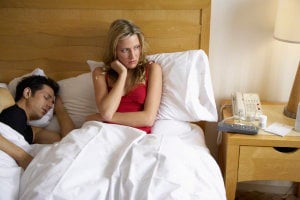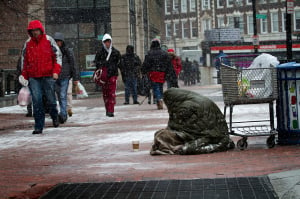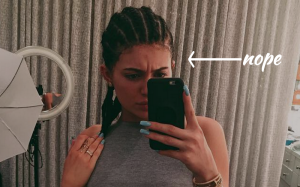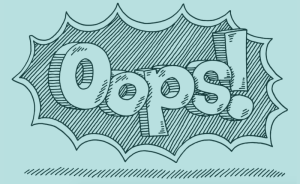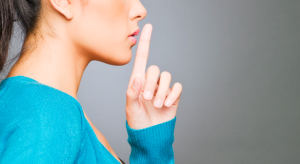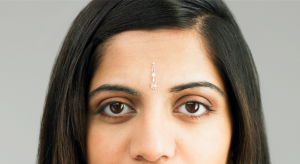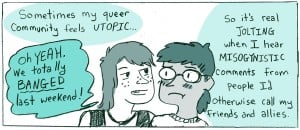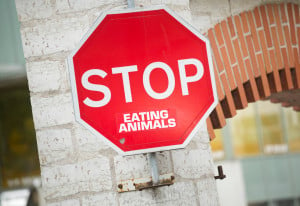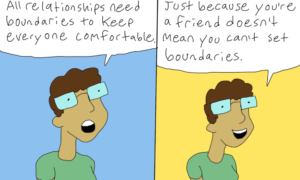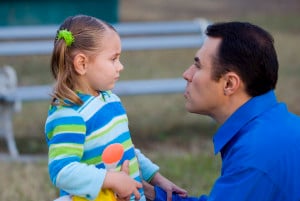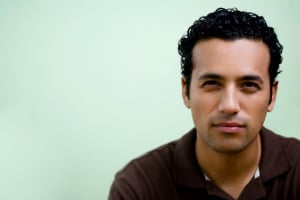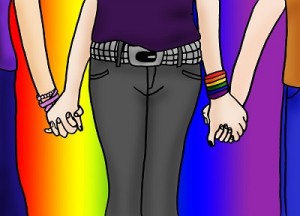
Source: WestWord Blog
Let’s talk about monosexism.
You might be asking yourself, “What is monosexism?”
Typically, we only discuss sexism in terms of gender, but it also has applicability to biases related to sexuality.
Monosexism is synonymous with biphobia in many ways because it perpetuates the myth that a person can only truly be attracted to one gender. Monosexists reinforce binary thinking through their insistence that orientation is confined to the two polarities of either straight or gay.
It’s time for everyone’s (least) favorite cliché: the promiscuous bisexual! (or pansexual!)
Monosexism thrives in both straight and gay communities because everyone can agree that bisexuals just can’t keep it in their pants. Non-monosexuals are perceived as greedy, fickle, or simply attention-hungry. This includes bisexual people and pansexual people (who are attracted to individuals regardless of their gender or sex, including people outside the gender binary of woman and man.)
The assumption is that bisexuality and pansexuality are purely physical, and therefore, a bi/pansexual person can never truly be satisfied if they are limited to a single, monogamous partner.
One half of their desire is “neglected,” and therefore, the other gender represents increasingly tempting forbidden fruit before inevitable infidelity. We’re essentially the succubi of the queer community.
Monosexism Across Communities
Straight and gay perspectives justify monosexism for different reasons.
Straight people have the tried-and-true method of homophobia, but for the more allegedly open-minded bigot, the constant threat of their partner choosing the other team jeopardizes traditional heteronormative narratives of progression and stability of gender roles within relationships.
You better get your rainbow away from their white picket fence!
The perception that you could hypothetically desire the same people might freak them out because it undoes their idea of sexuality as existing within a masculine/feminine binary.
You could turn gay at any minute, so they don’t want their sexual integrity marred by trusting you.
In other news, straight monosexists have no concept of monogamy.
Monosexism is almost even more ingrained in the gay and lesbian community, fueled by anxieties around queer legitimacy.
Many will claim that they fought for their identities and don’t want to waste their time on someone who could easily retreat to the safe haven of straight privilege whenever they felt like it.
Gays and lesbians are the “true” queers, and everyone else is passing through until they fully commit to a side.
Non-monosexuals are treated with suspicion since they didn’t necessarily have to forge their queer identity through the same struggle.
After all, discriminating against a community’s right to sexual expression isn’t hypocritical in any way.
You could return to the comfort of straightness at any minute, so they don’t want their sexual integrity marred by trusting you.
In other news, gay and lesbian monosexists have no concept of monogamy.
Monosexism and Bi/Panphobic Myths
Fear of impulsivity rationalizes monosexism again and again.
Bi/pansexuals can’t be trusted because they are read as free radicals of orientation, ready to opt out of their current community as soon as a more appealing offer comes along, or merely unable to resist whatever fulfillment that can only be provided by a different gender.
Trust issues are trust issues no matter how you slice it.
If you’re that worried that your partner is going to cheat on you, you should probably have a discussion with them.
It’s absolute bullshit that bi/panphobia validates blaming your insecurities on someone else just because you unfairly assume that their orientation could turn them into a rogue nymphomaniac.
One of the main myths fueling this misconception seems to be the idea that bi/pansexuality is purely lust-driven and gender dependent.
First off, if a person is bi/pansexual, it doesn’t mean that they want to have sex with everyone. That would be exhausting!
It doesn’t mean that their primary motivation is physical attraction. Bisexuals are assumed to be attracted to equal numbers of men and women (usually confined to normative gender presentations to underscore the difference), but nothing could be further from the truth.
In fact, many bi/pansexuals simply view themselves as capable of forming a physical and emotional connection regardless of gender, rather than because of it.
Before I go any further, I want to emphasize that my intention is not to put bi/pansexuals who prefer monogamous relationships on a pedestal above those who don’t. I’m not here to slut shame.
If someone who identifies as bi/pansexual wants to pursue casual sex or open relationships, that’s totally within their right and they shouldn’t be subjected to any prejudice.
The point is that everyone is free to choose to express their sexuality however they want and that this expression is not dictated by orientation.
Gendered Bi/Panphobia
I also find it interesting how bisexuality is perceived differently across gender.
Specifically, there appears to be a stigma against bi/pansexual men.
Men’s sexuality is presumed to be much more concrete and inherent than women’s, meaning that bi/pansexual men are seen as closet cases in denial.
In my experience, even some of my most open-minded female friends hesitate over whether or not they would date a bi/pan guy because they’re skeptical that bi/pansexuality can exist in men.
Since our society so often conflates masculinity with heterosexuality, if a guy expresses any same-sex desire, it’s assumed to be much more pervasive than he lets on.
Surely he’s just deluding himself into thinking that he is attracted to women as a temporary security blanket!
And most women can’t deal with the potential imagined humiliation of being a beard and steer clear of bi/pan guys.
Bi/pansexual women may appear to be more widely accepted, but this tolerance stems from the same patronizing logic of monosexism.
Women generally have more leeway in terms of sexual fluidity than men.
However, any exploration of bi/pansexuality is chalked up to experimentation with the expectation that the woman in question will eventually outgrow her wild child phase and settle down with a man.
Bi/pansexuality in women is almost always understood as performative, done in service of the male gaze.
The traditional misogynistic ideology of infantilism reassures wider society that any woman with common sense won’t be able to resist the perks of straight privilege and come trotting back into the heterosexual fold.
Long-running jokes at women’s colleges confirm such skepticism with slang like LUG (lesbian until graduation) and “hasbian.”
Notice the androcentrism that pervades either side of the argument.
Bi/pan men are really self-loathing gays and bi/pan women are really childish narcissists feeding their self-absorption and avoiding adult responsibilities – i.e. anchoring their life around a man.
In both cases, masculinity acquires some sort of inescapable magnetic quality.
The universal pull of masculinity becomes wrapped up in phallocentrism.
Monosexism often overlaps with cissexism and transphobia, so trans men and women are usually thrown out of the equation.
Only cis men are capable of wielding ~the power of the penis~, which is what we’re all craving in the end, right?
Men are thus viewed as growing into queerness while women grow out of it.
This once again reinforces men’s sexuality as undeniable and women’s sexuality as malleable and easily influenced.
Gendered implications aside, both perspectives conveniently result in bi/pan erasure.
Bi/pansexuality doesn’t signal someone’s confusion or ambiguity about their orientation. It is an orientation.
Adding insult to injury. pansexuality is still seen as a made up orientation that people claim to make themselves seem “edgy” or special. Pansexuality is often conflated with bisexuality. Recognizing pansexuality is important!
We aren’t masquerading as holier than thou or scheming to cherry pick the benefits of either community.
Monosexism represents a lazy attempt at slut shaming an entire group of people for wanting “twice as many options,” when in reality, they might not see gender as a factor or they just like who they like.
Putting someone else down to stroke your own sense of superiority doesn’t do anyone any good in the end.
Gold Stars, Go Away
The concept of the “gold star gay” is another monosexist byproduct of binary ideals.
A gold star gay is a person who has never had sex with the opposite gender, suggesting that they’ve always had confidence in their identity and never cared about passing as straight.
Several problematic implications are at play here.
The gold star gay assumes that sexuality is a fixed moment of realization early in life.
Any heterosexual flings would be a sign of shame because those people must be closeted gays repressing their queer desire.
Perceiving heterosexual sex as dirty and irrevocably tainting someone’s sexual integrity perpetuates the same harmful stigmas as homophobia. (And what if you have sex with someone who currently or later identifies as transgender? Would your gold star be revoked?)
Not only does this logic once again exclude bi/pansexuals and trans individuals, but it expects everyone to know their concrete orientation from puberty and discounts longer processes of sexual self-discovery.
Stop creating an arbitrary hierarchy of queerness to jockey for authenticity.
There is no right way to be queer. That’s the point!
Remember: A person’s identity belongs to them and no one else.
***
If left unchecked, monosexism will continue to allow repetitive, tired prejudices to persist among both straight and queer people.
The good news is that it’s completely avoidable.
Since the LGBTQIA+ community is a supposedly safe space, maybe we should stop splitting hairs over everyone’s sexual expression.
Although a queer person may pass as straight if they’re in a heterosexual relationship, straight privilege by definition doesn’t exist for them because a) they’re queer and b) they still have to deal with prejudiced assholes on all sides, and I’m pretty sure that cancels out any ephemeral benefits of temporarily passing.
As for the straight community, you are not dating a secret closet case if you’re with someone who is bi/pansexual. And if you think you are, that’s probably evidence that you don’t understand or respect their identity enough to be with them.
Bi/pansexuality cannot be used as a barometer to predict future failure of your hypothetical relationship because that’s childish and, frankly, lazy.
Our identity is not a tool for you to reassert your own social legitimacy at the expense of others.
Our identity belongs to us.
We are not confused, we are not bored, and we are not desperate.
We’re proud of who we are, and no amount of petty judgment or stereotypes can take that away from us.
[do_widget id=‘text-101′]
Erin Tatum is a Contributing Writer at Everyday Feminism. She’s a feminist, queer theory lover, and television enthusiast living in Pennsylvania. She is particularly interested in examining the representation of marginalized identities in media. In addition to Everyday Feminism, she’s also a weekly contributor to Bitch Flicks. Follow her on Twitter @ErinTatum91 and read her articles here.
Search our 3000+ articles!
Read our articles about:
Our online racial justice training
Used by hundreds of universities, non-profits, and businesses.
Click to learn more





